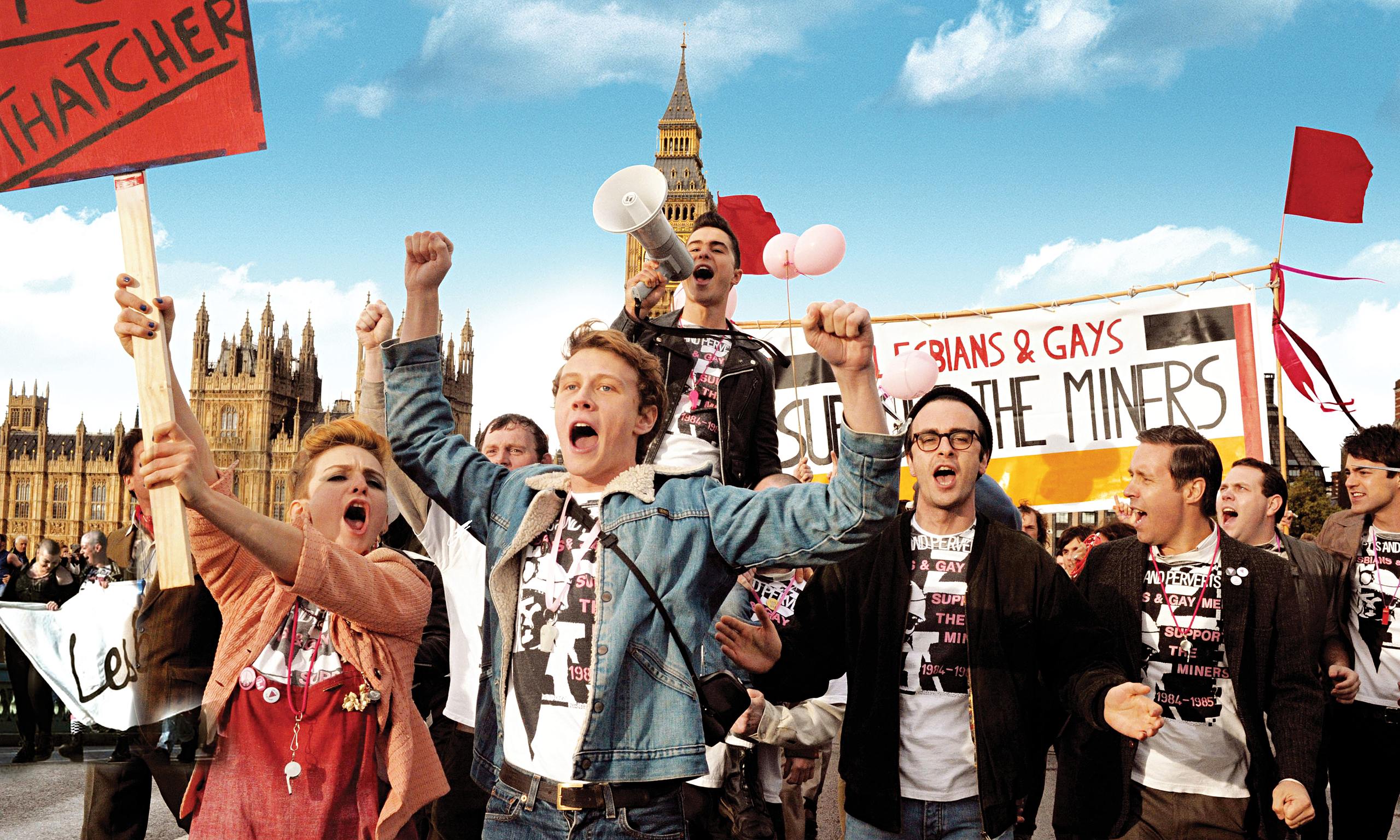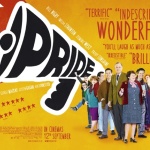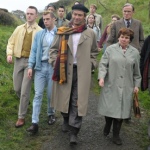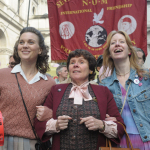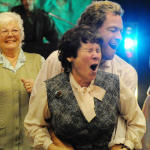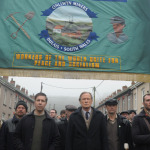I’m all for seeing the positive side of any mishap, and just occasionally serendipitous accidents can provide the happiest of outcomes. This is one such instance. I’d been due to see The Hundred Foot Journey, but owing to the anticipated screening at 6:10pm having evaporated for reasons unknown an alternative movie was required. Pride stepped up to the mark, having coincidentally been recommended by a friend.
Actually it did far more than merely stand it. From the first moment to the last, Pride demonstrated its credentials as an excellent movie. A comedy to be sure, but much more than “just” a comedy. It is based on a true story and if anything is a tale of a culture clash and the unlikeliest of alliances – proving that common humanity and collaboration can forge bonds across any divide – in this case, between a London lesbian and gay collective centred on a bookshop and the striking Welsh miners of a fictionalised village with whom they find a strong mutual connection and lifelong friendship and solidarity in one another’s struggles.
It will be interesting to see what younger audiences make of Pride, since it is a movie set in 1984-85 against the backdrop of the great miner’s strike, the rising pandemic of AIDs and, as recorded here, the rise of Bronski Beat within popular culture. My memories of the bitter rivalries and tensions in that era are probably very different to those experienced by miners and gays alike, but in the conservative suburbs both groups struck a note of fear – and while my parents didn’t necessarily say so openly you could easily imagine their fear had I been involved with either! George MacKay‘s character in the movie, Joe (aka “Bromley”) faces the tension between his own nature and coming out to his deeply suburban parents.
The Lesbian and Gays Support the Miners group, which raised money and provided reciprocated support for the miners, may seem to cross as vast gulf of cultural understanding as is possible within the British Isles, but as the fictional alter ego of the leading gay protagonist, the late Mark Ashton (Ben Schnetzer), points out in the movie there is much they have in common, not least because both miners and gays suffered prejudice, intimidation and abuse from large sections of society, but are fighting – in one case for their livelihoods and in the other for the right to be accepted for their sexuality.
They were also united by viewing Margaret Thatcher and her premiership as everything they stood against, the one politician who succeeded in creating such unlikely bedfellows where otherwise people would have lived their own lives forever in their silos. Maybe that is one aspect for which she should be thanked.
The battle for justice rages on but at least being openly gay does not, in most cases, result in the end to your life and career. Sadly the miners lost their strike – pit closures went ahead and thousands lost their jobs. Coal mining remains in steep decline thanks to the need for renewable carbon-free energy sources. Who knows – it may yet come back into fashion at some point given that we have an estimated 300 years worth of extractable coal in seams beneath the British isles.
Matthew Warchus has made a passionate movie that wears its heart on its sleeve, but one that wins out by involving rather than preaching to its audience. Out of the subject matter and conflicts on both sides comes heartwarming drama and loveably feisty characters and gradually the divisions fall. He’s taken a sparky and irresistibly funny script by Stephen Beresford, brought it to life and imbued it with the sort of energy you normally associate with teenage musicals.
Warchus is greatly helped by a fine cast of (mostly) British actors, veteran and juniors alike. There’s an extent to which you can’t go wrong with fine dependable elder statesmen and women of stage and screen such as Bill Nighy and Imelda Staunton, but even Nighy dispenses with his usual screen persona to become an elder statesman among the striking miners and mainstay of the local committee in spite of a bleak and shyly taciturn personality harbouring his own closet homosexuality.
In the course of the movie, Nighy’s Cliff faces his own demons and challenges the orthodoxy of culture within the Valleys with a quiet and resolute determination, though Staunton’s Hefina has no such qualms – she is life and soul from the first and takes the lead in making their guests welcome as they visit the small mining town for the first time, first of many.
There is barely a duff note among the supporting cast, but special credit should go to Dominic West for his portrayal of another real life character, Jonathan Blake, who, it transpires, was among the first people to get AIDS – yet he is still alive to tell the tale today, where Ashton tragically died at 26 very shortly after his diagnosis. Like Nighy, West underplays Blake to great effect with the exception of one scene – a truly energetic dance routine in the Welsh social club that sees the women joining in and elicits a respectful round of applause from the men.
Ignore political correctness, the real reason you should beat a path to your local cinema to see Pride has nothing to do with its subject matter, but simply because it is warm, fresh, very funny, fizzy and utterly charming. No doubt about it, it’s also the sort of tearjerker that does not need a heavy hand ladling on the schmaltz or play with your emotions – it does so though being genuine and honest about its subjects and the changes, almost naively so. The tingle down your spine begins when a woman starts single an unaccompanied and charged version of Bread and Roses – and such moments continue at regular intervals. I wept buckets.
As such, it makes a welcome change from cynically manipulative movies that the big Studios churn out, but does so without ever becoming pious or didactic. That is one hell of a tightrope to walk, but trust me on this one – this is a truly deserving success.
Victory to the miners!

